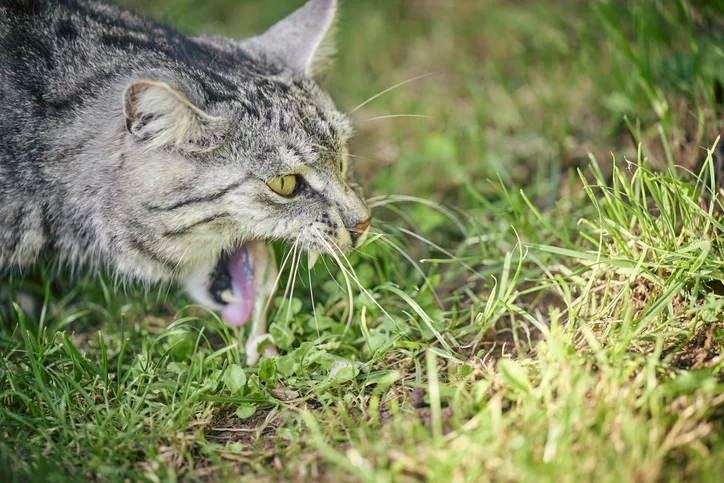Should I Quarantine My Cat with Tapeworms?
Tapeworm is anything but pleasant, as it is a contagious parasite. Cats can get tapeworms by ingesting an infected flea during grooming. They can also be more likely to contract tapeworms from hunting an infected animal, such as a mouse or squirrel.
You should quarantine your cat if they have a tapeworm. Once you administer dewormers, you should quarantine them for a few days to be safe. Quarantining your feline companion is necessary to protect any other pets you may have in your family and prevent the further spread of the virus.
Even though tapeworm is rare in humans, quarantining your cat is a good idea due to the slight chance you or a family member could swallow an infected flea. To learn more about quarantining your cat with tapeworm, peruse this informative article.
What is a Tapeworm?
Tapeworms are colonic parasites that are small. These worms can be viewed without magnification. They look somewhat like little moving grains of rice. The most common tapeworm that occurs in companion animals is called Dipylidium caninum. A dog or cat can ingest a tapeworm while grooming. The characteristics of these worms:
- Long
- Flat
- White
- Segmented
These tapeworms suction their mouths onto the cat’s small intestine wall and absorb the nutrients that travel through its body. Once these tapeworms are attached, they grow larger. They can grow to be about 4 to 28 inches in length. These tapeworms develop and mature inside the intestine.
The tapeworm takes about four weeks to grow to its largest size. As the tapeworm grows, the segments of the worm split apart from the main body and pass through the infected cat’s stool. You may see them crawling upon the cat’s feces. Each segment is as small as a grain of rice and holds as many as 20 tapeworm eggs.
What Causes Tapeworms?
Cats are not infected by directly ingesting the tapeworm eggs. For a feline to become infected with tapeworms, they would need to consume an intermediate host infected by the tapeworm itself. For instance, if a cat eats a small infected animal, they, too, will become infected. Some examples of animals that could carry tapeworms:
- Mice
- Rabbits
- Squirrels
- Infected fleas
Fleas devour tapeworm eggs, and your cat is susceptible to eating the infected flea during grooming. If the infected flea gets on your cat and they consume it, the cat will become infected. However, it is rare for a human to become infected by tapeworm, as they would likely need to swallow an infected flea accidentally.
Tapeworms can also be caused by a cat eating the stool of another animal infected by a tapeworm. It is more common for an outdoor cat to be infected with tapeworms since they tend to be hunters. However, indoor cats may acquire tapeworms if they live in a flea-infested area. More likely, a cat would get tapeworm from ingesting an infected flea than any other way.
If a cat accidentally ingests a tapeworm-infected flea when grooming themselves, the flea will be digested. During digestion, the tapeworm distributes its eggs and fastens itself to the intestinal wall, and the tapeworm will come out in the stool.
What Are the Symptoms of Tapeworm?
Sometimes cats do not outwardly display symptoms of tapeworm. This is why annual checkups are so crucial for your precious feline. During their exam, the vet will check the stool to make sure there are not any problems. However, watch out for some of the following symptoms of tapeworm in cats:
- Poor coat condition
- Biting or licking at their anus
- Mild diarrhea or vomiting
- Tapeworm segments in the stool
Despite having a normal or increased appetite, the cat may also demonstrate weight loss. This weight loss is due to the tapeworm sucking out all the nutrients that the cat consumes through food. The cat may drag their rectal area across the floor due to discomfort and in an attempt to scratch the infected area.

Should I Quarantine My Cat with Worms?
Tapeworms are highly contagious to both pets and humans. Even though humans do not often come in contact with the tapeworm, it is always possible if your pet carries fleas. Some of the reasons it is necessary to quarantine your cat with tapeworm:
It Decreases the Risk to Other Pets
If you have other cats and dogs in your family, they may contract tapeworm from your infected feline, making it very difficult to eliminate the parasite that has set up shop in your home. The best way to prevent infection in another pet is to quarantine your cat during deworming.
It Keeps the Infection Relegated to One Area
If you set up your cat with tapeworm in a separate room in the house, it minimizes the risk that the infection is spread and limits the space in which your cat can go, which makes cleaning the area much more straightforward. The tapeworm and eggs are also less likely to spread the virus if they are only kept in one specific room in the house.
It Avoids Passing it To Humans
Although extremely rare, there are certain tapeworms that humans can contract. This is why quarantining your cat is necessary for your family’s health. You or a family member would have to eat a flea infected with tapeworm to be affected. However, it is prudent to be cautious. The worst that can happen is you consume an infected flea and end up with stomach pain and diarrhea.
How Long Should I Quarantine My Cat?
The amount of time you should quarantine your cat depends on several factors. As soon as your cat is diagnosed with tapeworm, you should quarantine them for at least a few days. If you have only one feline, you should confine them for about four days. The time your cat should be quarantined depends on the deworming medication.
You should keep your cat in quarantine until the parasite is eradicated. If you have other companion animals, you must separate them from your infected cat. You should also keep them quarantined for longer if you have other pets. It is the best approach to safeguard your family’s fur babies.

What is Treatment and Prevention for Tapeworm?
Tapeworm treatment is dewormer medication. These are anti-parasitic medicines that kill the worms in your cat. They work by allowing the worms to leave the intestine. The dead worms and eggs come out through the stool. Many dewormers work within 24 hours. Sometimes tapeworm sticks around for longer and requires another dose of dewormer to get rid of the tapeworm.
Tapeworms can reoccur in cats, which is why prevention is critical. Flea prevention medicine is crucial for the prevention of fleas. If you provide your cat with this treatment, the chances they will contract fleas will be much lower.
Another way to prevent your feline from catching fleas is to shelter them in the house. This will decrease exposure to other animals, especially ones that can carry fleas. Fleas are passed quickly from one animal to another. It will also keep them from hunting other animals that have fleas.
Conclusion
Tapeworms are parasites that can cause infection in your cat. You should always quarantine a cat with tapeworm to help prevent the spread of infection. Speak to your vet about your feline’s best treatment choices or flea prevention medicine.
If you have any questions regarding tapeworms in your cat and what to do, The Village Vets of Atlanta, GA is here to help. Find a location near you today!
Recent Posts
About The Village Vets
The Village Vets is a network of animal hospitals based in Atlanta, GA and the surrounding area. We offer honest, excellent service to our clients in a comfortable, friendly atmosphere. To learn more about our locations and how we can better serve you and your pet, click the button below.
Share This Post
Recent Posts
About The Village Vets
The Village Vets is a network of animal hospitals based in Atlanta, GA and the surrounding area. We offer honest, excellent service to our clients in a comfortable, friendly atmosphere. To learn more about our locations and how we can better serve you and your pet, click the button below.



